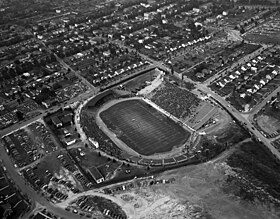Gold Bowl
| Gold Bowl | |
|---|---|
| Stadium | City Stadium |
| Location | Richmond, Virginia United States |
| Operated | 1976-1980 |
| Conference tie-ins | MEAC, CIAA |

The Gold Bowl was an American
History
On August 29, 1976, officials of the MEAC and CIAA announced that their champions would meet in a postseason game called the Bicentennial Bowl, to be held at Memorial Stadium in Charlotte, North Carolina, on the first Saturday of December.[1] Plans changed that October when Black Super Conference, a Houston-based television network, offered to televise the inaugural game, but on the second Saturday of December rather than the first. Memorial Stadium was not available on that day, prompting bowl organizers to move the game to City Stadium in Richmond.[2] In September 1977 the two conferences announced that the game would remain in Richmond, rebranded as the Gold Bowl, and move to the first Saturday in December.[3] Bowl organizers made the game the centerpiece of a festive weekend including a Gold Bowl parade and, as of 1978, a Friday-night basketball doubleheader featuring four HBCU teams.[4]
South Carolina State of the MEAC was recognized as Black college football national champion after winning the 1976 game,[5] and as co-champion after winning the 1977 game.[6]
The success of the MEAC vs. the CIAA ultimately caused the Gold Bowl to be discontinued. The MEAC had been founded in 1970 with a core membership of six schools that seceded from the CIAA, with the ultimate goal of competing at the highest level of the NCAA. In June 1978 the MEAC achieved reclassification from Division II to Division I and began to play in the NCAA Division I Football Championship Subdivision (then known as Division I-AA) that fall. Meanwhile, the CIAA remained in Division II, and the competitive gap between the two conferences soon became apparent. MEAC teams won four of the five games, and trounced their CIAA opponents in the 1979 and 1980 Gold Bowls. In April 1981, CIAA officials announced that the game was being discontinued, and that in future years the conference's signature football event would be a neutral-site conference championship matching the first-place teams of its two divisions.[7]
The Gold Bowl remains unique as the only postseason football contest that has matched teams from different divisions within the NCAA.
Aftermath
The parade and other social activities developed for the Gold Bowl survived as part of the in-season Gold Bowl Classic, created in July 1981 and first contested that October, between Richmond's own
The MEAC eventually joined the other HBCU conference at the Division I-AA/FCS level, the Southwestern Athletic Conference (SWAC), in sponsoring the Heritage Bowl (1991–99) and the Celebration Bowl (2015–present).[10] The CIAA eventually joined the other HBCU Division II conference, the Southern Intercollegiate Athletic Conference (SIAC), in sponsoring the Pioneer Bowl (1997-2012) and the Florida Beach Bowl (2023–present).[11]
Game results
| Date played | Winning team | Losing team | notes | ||
|---|---|---|---|---|---|
| December 11, 1976 | South Carolina State (MEAC) | 26 | Norfolk State (CIAA) | 10 | [12] |
| December 3, 1977 | South Carolina State (MEAC) | 10 | Winston-Salem State (CIAA) |
7 | [13] |
| December 2, 1978 | Virginia Union (CIAA) | 21 | North Carolina A&T (MEAC) | 6 | [14] |
| December 1, 1979 | South Carolina State (MEAC) | 39 | Norfolk State (CIAA) | 7 | [15] |
| December 6, 1980 | North Carolina A&T (MEAC) | 37 | North Carolina Central (CIAA) | 0 | [16] |
References
- Newspapers.com.
- Newspapers.com.
- Newspapers.com.
- Newspapers.com.
- ^ Frank Bannister (16 December 1976). "Top 20 Black Colleges". Jet (p. 50).
- ^ Frank Bannister (22 December 1977). "Top 20 Black Colleges". Jet (p. 51).
- Newspapers.com.
- Newspapers.com.
- Newspapers.com.
- ^ Hunt, Donald (31 March 2015). "HBCU greats laud the Celebration Bowl". ESPN. Retrieved 21 December 2019.
- ^ Scouten, Ted (14 September 2023). "New Florida Beach Bowl game will feature 2 HBCUs during post-season play in Fort Lauderdale". CBS Sports. Retrieved 25 November 2023.
- Newspapers.com.
- Newspapers.com.
- Newspapers.com.
- Newspapers.com.
- Newspapers.com.
